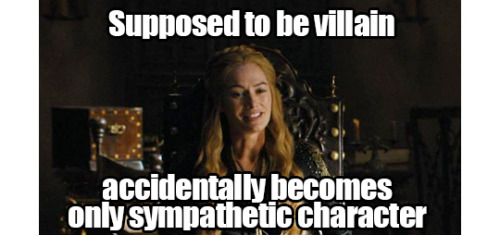
That’s right. HBO’s flagship program, the Emmy-winning universally hailed drama that has taken the television industry by storm for the past few years is just…bad.
No, this isn’t clickbait. No, this isn’t a piece that gives ironic reasons for our dislike of it, such as “we have to wait so long in between seasons!” When we say that Game of Thrones, by showrunners David Benioff and Dan Weiss, is bad, we mean it in the strictest sense. It is lousy, substandard entertainment by just about every single metric other than the fact that it looks really, really nice and the actors are incredibly talented.
If you’ve been around The Fandomentals before, this isn’t going to surprise you. After all, we (Julia and Kylie) have not been remotely shy in voicing our distaste for the program, nor miserly in providing reasons why we feel this way. In fact, we just spent months going back through and watching/analyzing every single plotline of the most recent season, one at a time, to unveil just how odious it is. And yes, before you (dear reader) suggest that we could just turn off our TVs if we think it’s so terrible, the thought has occurred to us. We happen to find value in deconstructing the flaws, plus we wouldn’t even bother if it wasn’t such a critical darling.
However, as we are coming up on our third season now of being quite vocal detractors, we do recognize that a lot of what we write about GoT is not quickly accessible. For instance, we make jokes about “Larry and Carol Larroling all over the place,” and it makes perfect sense to us as biting commentary. But for everyone else… yeah; it’s meaningless. Moreso, when we’re at parties and happen to let it drop that we don’t like GoT, if we’re not allowed to hide in a corner with our mumbled “we just like the books hee hee”, we’re asked to bring out reasons. Sometimes those reasons aren’t very easy to articulate, especially to casual viewers. Mostly because there’s so many at this point. Where do we even begin?
We do want to say right now: we don’t blame anyone who likes GoT and we don’t think lesser of anyone who likes GoT. We recognize that most people spend their ten hours a year looking at it and finding it pretty cool. Heck, it’s fine even for people who rewatch it—ask Kylie who her favorite James Bond is. It’s not like we can’t enjoy pieces of media that aren’t Citizen Kane.
It’s just that with GoT, people treat it like it’s…worthy. Worthy of consideration, of praise, of awards. Yet what we’ve found to be the one constant of this show is that it falls apart under the most minute amount of scrutiny. It’s true, it is the easiest show in the world to “turn off your brain and enjoy.” At the same time, there are enough “deeper” concepts introduced that it feels intellectually engaging. So, we promise we’re not here to judge, especially since it can be quite enjoyable to try and think deeply about it and fill in the (many) blanks. We’re just here to disabuse anyone of the notion that this show, as a narrative in and of itself, is quality literature.
We also need to get something else out of the way: we like A Song of Ice and Fire. A lot. We’re not going to talk about the books here, though. We’ve argued before that they have nothing to do with each other at this point, and even though we could easily whip out fifteen thousand words on how GoT is the perfect thematic opposite of the books it’s pretending to adapt, this isn’t the place. The show falls apart on its own merits without dragging its atrocious adaptational decisions into this.
Therefore, without further ado (we know), we present you with the 9 major reasons why GoT is an objectively bad television show.
1. The Setting is So Inconsistent it’s Rendered Worthless
One of the major appeals of GoT is its rich, deep world with so much texture and backstory. The map in the credit sequence is evidence of how much Westeros serves as a draw. And even though we just said we weren’t going to talk about the books, we do have to say that the the writers used the scaffold of George R.R. Martin’s world to establish the universe for the show. However, as time has gone on, that scaffold has begun to fall apart, and it’s a hazard for any contractors to set foot on now.
What’s nice is that the details of Martin’s setting are widely accessible to GoT fans, for those who want more engagement. Want to read about the Night’s Watch in greater detail? Well, Martin’s done that work, and you’re sure to find it on the exceedingly thorough Game of Thrones Wiki. Even HBO releases promotional material that provides deeper contexts for everything, like their “History and Lore” video about Dorne, where they mentioned absolute primogeniture as a notable feature of the land… only for us to never find out about it within the show-proper.
We’re not saying every aspect of Martin’s world should make it onto the screen. Not even close. We’re just saying that there is a convenient fallback to make up for otherwise shoddy worldbuilding. Worse still, this shoddiness is two-fold.
Firstly, the actual physical settings of Westeros and Essos on the show are inconsistent because there’s no attention to detail. This is easy enough to ignore if you choose not to think about it, but we have to guess even the most casual viewer thought it was a wee bit odd when Arya warped from Braavos to the riverlands in the final few episodes of Season 6, especially since most of the other characters had barely moved in that two-episode span. Or, even better, Varys warped from Meereen to Dorne and back onto Daenerys’s ships leaving Meereen, the last magical teleportation taking place in the span of ten minutes of screentime.
The more you know about the setting and the source material, the worse this becomes, but it’s not as though it’s imperceptible to everyone else.
Similarly, the timeline makes no sense. Since there are many characters that rarely interact, their timelines are pretty independent. But, once they get together, it’s always a mess.
For instance: Jaime traveling to the riverlands and taking care of the situation at Riverrun works fine in its own time bubble. However, when you have to place it against the events that take place in King’s Landing, what we’re left with is Jaime and an entire army traversing hundreds of miles when only a few weeks (at MOST) passed for his sister. Even if we say “oh this scene happened a month before the following scene,” there’s no real excuse to have that kind of chronological hodgepodge in one episode. Also…we knew before Jaime left King’s Landing that Cersei’s trial was right around the corner. They didn’t have to have Cersei say, “In a few days, he’ll have a trial for me” back in Episode 4 and create this confusion in the first place. The word “soon” was always an option, which we feel we shouldn’t have to point out to Emmy-winning writers.
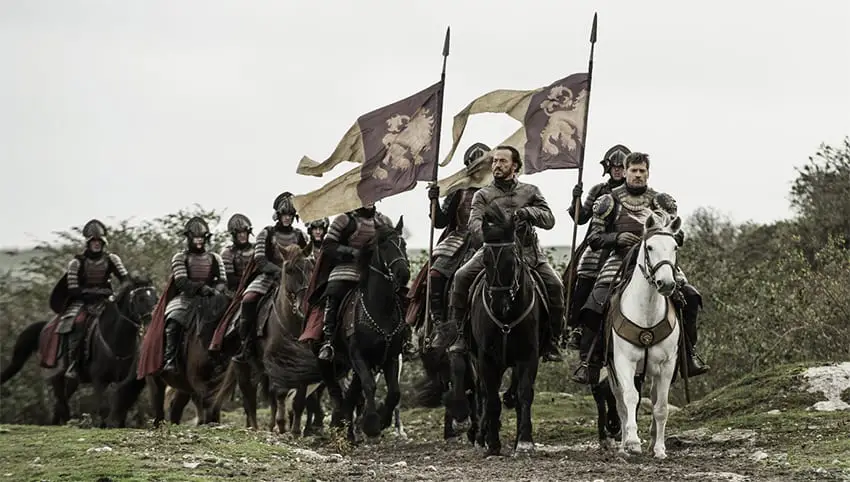
This is one plotline, in one season. Remember when the Sand Snakes waved goodbye to the ship that carried Myrcella and Jaime and Trystane, and then Season 6 opened with two of them having warped onto it? Which after hours and hours of debate, we still can’t decide where the ship even was when this happened?
We’ve been told these are nitpicks before, and like we said, they are small enough that you can usually ignore them. Not that it’s a great excuse for the writers to be blatantly sloppy and/or lazy. But we also suppose it doesn’t ruin the immersion of viewers who happen to be less familiar with the military advantages of Moat Cailin than we are.
But that brings us to the second major flaw in how this setting is written: Westeros as a society does not make any sense. This is a show that has hidden behind the excuse of “historical realism” before. And yes, we know most people understand that this isn’t historical. However, there is a “reality of the world” that is often trotted out whenever there’s upsetting material.
“That said, when we decided we were going to do that we were faced with the question: If [Sansa’s] marrying Ramsay, what would happen on her wedding night? And we made the decision to not shy away from what would realistically would happen on that wedding night with these two characters, and the reality of the situation, and the reality of this particular world.” —Bryan Cogman
We will tackle the violence against women later, but the main point is, if Cogman is using this as a defense, and in doing so suggesting that what happens isn’t by definition gratuitous since it inherently offers commentary on the setting (and therefore the story as a whole), then the writing team better be prepared to follow-through on this and create a setting that could have meaningful takeaways.
They do not. We have come to call this the “magically disappearing patriarchy.” You see, from what we can tell, the setting adapts to the needs of a given scene, especially the tonal needs of the scene.
When a scene is dramatic, and dark, and shocking, the setting adapts so that these dark and shocking moments can come to pass, be it a woman being abused, someone being murdered, etc. When a scene is funny, the inconvenient aspects of this misogynistic, fundamentally violent society somehow fade away.
Our favorite example of this came last year when Sam visited Horn Hill. His father had previously been established as a terrifying, abusive figure, and there was nothing in the episode to change that impression either. Well, with one exception: the way the women of Horn Hill behaved. Sam’s mother and sister were sassy, rather assertive, and perfectly willing to stand up to Randyll Tarly at his table to vouch for a wildling woman, who they previously thought was a sex worker. There’s so many reasons this would never happen in the books, or even in an abusive household today, but what it did was sacrifice any sense of realism or patriarchy, if we may, for women standing up for themselves.
Which yeah, we know we sound crazy saying we don’t want women standing up for themselves and defending other women, except for the fact that the shit everyone else goes through on the show only works if women are consistently disempowered in this kind of situation. The world where Sansa gets raped because that’s “what would happen” on a wedding night with Ramsay conflicts with a world where the abusive, martial Randyll Tarly is dressed down by his wife at his own table. And there’s no indication that this is abnormal behavior on her part, by the way. She walks off and Randyll comments on what a “fine woman” she is. Just a few scenes after this, Walder Frey pulls a terrified child bride onto his lap. Why is the “reality of her world” night and day compared to the empowerment at Horn Hill?
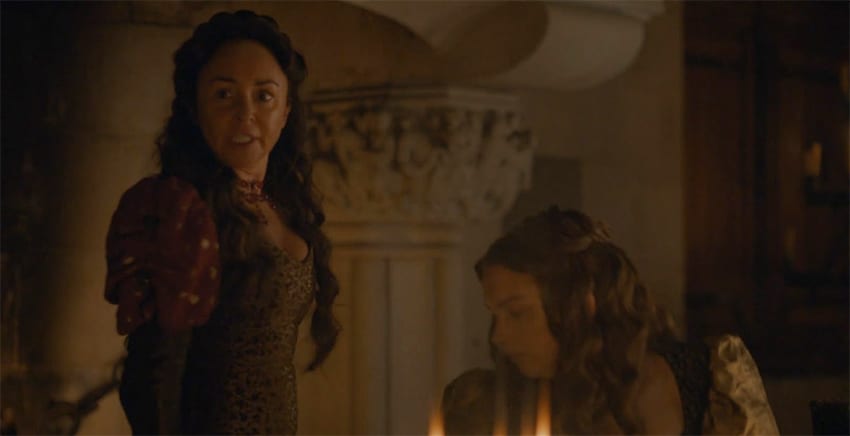
The big trouble with this is, of course, that there’s a space for apology for any woman who suffers. If Sam’s mother is free to stand up to a completely terrifying guy, then why couldn’t Sansa have asserted herself more to prevent that stupid marriage-for-revenge plot? How can any woman’s challenge of the patriarchy truly mean anything when the writers don’t seem to understand what the patriarchy is and how it actually affects human beings?
Don’t even get us started on the Dothraki.
#2. Characterizations are Inconsistent
Once again, we aren’t talking about as adaptations. It’s true, these characters are so wildly different from their source material counterparts that we have an entire system of nicknames devoted to separating them in our minds, but that’s for another day.
Rather, we mean that characterizations are inconsistent against each other. Sometimes it’s just a matter of season-to-season resets. However, for some poor characters, we actually have no clue how they’re going to behave in a given scene because it’s based entirely on the needs of the plot.
Cersei is our favorite example, because she amuses us the most. For the large bulk of the show, she was portrayed as a rather reasonable woman. She had her moments of horribleness, like in “Blackwater”, and we were often times told how awful she was by everyone else around her (especially Tyrion). But from at least Season 4 onwards it’s really hard to view her actions as particularly bad. Sure, she pushed for Tyrion’s execution more than the audience would have preferred, but at the same time, there was no indication that she wasn’t sincere in her belief that he poisoned Joffrey. Additionally, Cersei’s entire plotline seemed to revolve around getting unbelievably negative feedback just for being a [somewhat] politically ambitious woman, while her son was being actively abused by Margaery, the Tyrells were twirling their mustaches at her, and she received a threatening snake-in-the-box message from Dorne that demonstrated her daughter’s life was in danger.
Really, from Season 5 on, we’ve found the marketing surrounding Cersei utterly mystifying. We keep on being told that she’s evil, and would do anything for power, and yet up until the very last episode of Season 6, that’s simply not the story on our screens. We go into this in quite some detail here, but she really just gets screwed over by every single person she tries to talk to, all while very reasonably working to protect her children from real and active threats to their persons. Despite never being taken seriously and everyone being mean to her. Cersei, ironically, was one of the most consistent characters, at least for two or three years.
Then she blew everyone up.
She blew everyone up, she wine-boarded a nun, and she smirked and drank in her Outfit of Supreme Evil™. While this was certainly seeded by the promotional materials, as well as a few clunky lines, like Tommen saying Cersei would totally have murdered Prince Trystane (what?), this wasn’t in-line with the character we had seen on our screens. At all. We understand that “Evil Queen” is an easy trope to fall back on, but there actually needs to be evil stuff happening to justify that. What, she was slightly rude to Margaery once and therefore her violent bender was the only natural conclusion?
Still, for those convinced by the marketing, or who would just view it as Cersei finally reaching her breaking point, there’s the case of Sansa. At the end of Season 4, Sansa lied to the Vale Lords and donned an Outfit of Supreme Empowerment™ (very different) because she was now a shrewd player, using her intuition and manipulative abilities to get what she wanted. In Season 5, she kept the outfit for a bit, but was suddenly a complete idiot, incapable of asking very basic questions about Littlefinger’s plan for her to marry Ramsay Bolton to…get revenge on the Boltons. Then she was stripped of all narrative agency until Theon rescued her.
Well, cue Season 6, where there was literally no way to tell how Sansa would behave in a scene. Would she be awesomely assertive? Would she be ineffectually assertive? Would she just sit in the corner fuming for no reason when we had already seen her be awesomely assertive in the exact same situation? Would she stand there and forget all the forms of courtesy? Would she be grinning in delight at violence?
Before you give us any “multi-faceted character” shit, no. Just no. If we can’t even predict what Sansa might bring to a scene, that is a failure of a character. Tell us one reason why she was able to use her voice and mention military movement in “The Door”, but in “Battle of the Bastards” was rendered mute? Give us one reason why she vacillated from telling Jon he should take the Lord’s chambers in Winterfell, to in the very next scene looking miffed that he was made king. Did she not consider that she was the Lady? Was this a problem for her? Why was she muted for a second time?
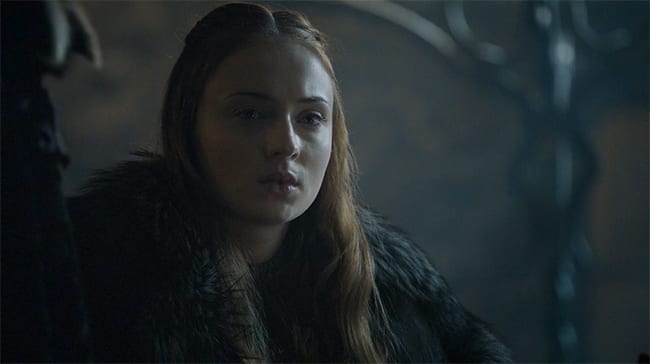
And again, these are just the couple we’re focusing on. Why does Arya suddenly begin rolling her eyes around Braavos and snarking at the end of Season 6? Why does Theon spend an entire season reconnecting with the Starks and doing right by them only to jet off for no reason? Why does Davos forget to ask a single question about Shireen after clearly spending multiple seasons loving and protecting her? Why does Jaime and Cersei’s relationship reset at the beginning of each season? Why does the High Sparrow spend two years as a shrewd political manipulator only to suddenly become a complete idiot and ignore Cersei attacking his own men just in time for her to bomb the whole sept?
Also, if anyone can come up with an adjective to describe Meera, we’d be appreciative. And no “brunette” is not enough.
#3. The Few Consistent Characters are Stagnant or Caricatures
There are a few notable exceptions to the “who are these people and how will they behave?” rule.
Tyrion, for instance, is a character that’s exceedingly consistent. He is perfect. Everyone who’s good agrees that he’s perfect. Everyone who is bad, doesn’t like him, or tells off-screen dwarf jokes. There was half a second this past season that we thought Tyrion was being challenged because the slavers still attacked Meereen, but no. They were going to anyway, and only Tyrion had the answer for how to beat them in the end.
We think it’s great that Tyrion is such an unproblematic fave, but to us, he’s the most boring and literal Mary Sue that’s ever graced our screens. The show is, in many ways, a series of bad things that happens to him, and how he overcomes them just by being awesome, or by random people being randomly wonderful to him.

It’s true; he drinks and he knows things. And that’s all one needs know about his character, because there’s sure as hell not any more depth to it.
Speaking of Sue tropes, there was a Villain Sue that was something of Benioff and Weiss’s favorite for the past couple of seasons. We speak of Ramsay Bolton, whose only defining trait was how badass he was in his evilness. We’d get scene after scene reminding us of this. Oh, thought that old lady might help Sansa? Fooled you! He flayed her. Thought Sansa had the upper hand in a dinner conversation? Fooled you! He knew just when to bring out Theon. Thought Osha might be able to stab him? Fooled you! Also, let’s spend three full minutes of screentime for him slaughtering Fat Walda and her baby.
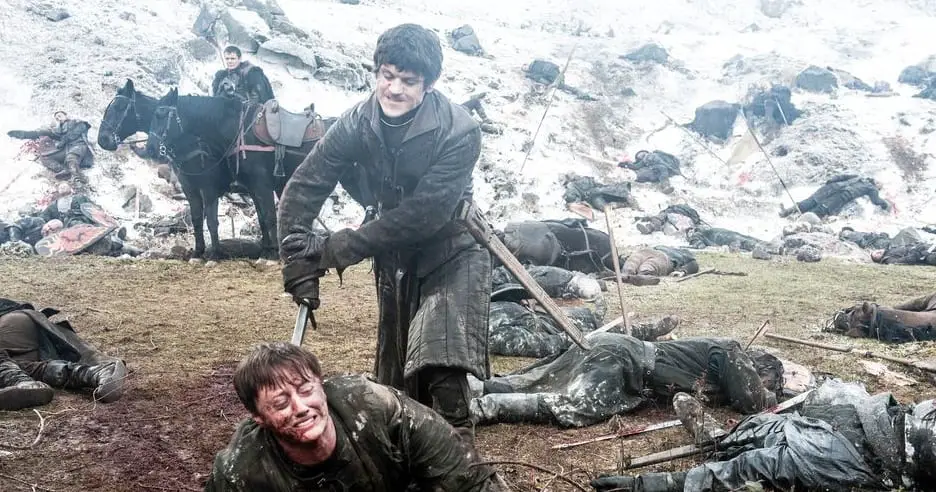
There was a hint at *something* beneath the surface with his relationship to Roose. This raises the question of why they’d even try to flesh out someone who’s clearly just a rapist asshole. But it’s hard to call this attempt a success. Ramsay was awesome in his evilness, and Roose was reasonably impressed, until the scene required that he wasn’t impressed. He went from praising Ramsay fighting off Stannis to yelling at Ramsay for his mistreatment of Sansa, as if the whole marriage had been Ramsay’s idea.
Really, there was just nothing interesting about Ramsay. He was evil. We get it. He also took over our screens for an incredibly long time, and in the end, he wasn’t even hoisted by his own petard. He was screwed over by a randomly materializing army. (Unless we want to pretend that the only motivation Sansa had in fighting for her home was being raped, which is bag of worms for another day.)
Who else is consistent? Well, there’s that one plucky swordfighter who always tells bawdy jokes. Bronn! Wait no, Daario! Wait no, Sandor! In fact, Sandor has been so badly Flanderized at this point, that he’s a walking chicken joke meme. Sure, he’s consistent, but is this really a character worth sinking any effort into? There’s nothing to unpack here.
The Waif was also a consistent character. She was a violent asshole who hated Arya. For…reasons.
Sorry, forgive us for not falling in love with these guys.
4. Character Arcs are Messes at Best, but Usually Nonexistent
Our previous two points did touch on this, but one of the biggest problems is that despite these characters’ personality flaws (that give us adequate pause), they don’t even change or evolve naturally. They can’t when their personality has either completely stagnated, or is based on plot-demands. However, it might surprise you to also learn how completely meaningless their adventures have been.
For example: remember when Jon was dead? He was dead. Died. Gone. We’d think this might have an impact on his character, but aside from moodily eating soup for a scene, it was completely impalpable. It gave him an excuse to quit the Night’s Watch (kind of), but otherwise, he just…led an army. Maybe he was supposed to be angrier or broodier than normal, though he seemed just as brooding in Season 1 to us. He swung his sword at Hardhome as well as he did at Winterfell.
He was made king too, so you’d think he did something to earn that, or grew into some kind of leadership position, but no. He just ignored all good advice and marched an incredibly smaller force face-first into an obvious trap set by Ramsay, getting everyone killed in the process (until Sansa showed up and saved his stupid ass). He didn’t earn that rescue any more than his kingship, but hey. Cue that emotionally significant music in the final scene all the same.
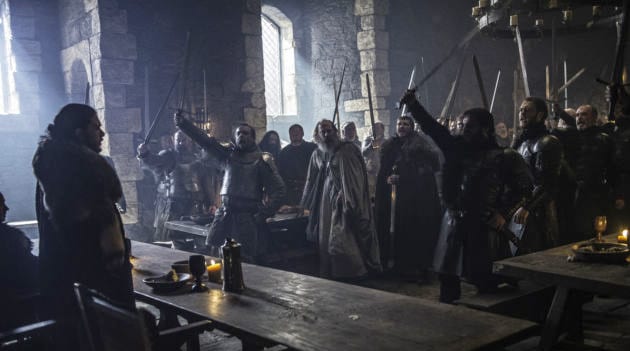
Guys, this is the protagonist of the show. What was his arc? What was his arc the year before? “These xenophobes sure don’t like wildlings and aren’t very genre savvy?” We’re thrilled that he finds new ways to swing his sword every year, and that we were given an on-screen reason for Kit Harington’s haircut, but that’s not actual growth.
Arya is the other example we’d like to highlight, because never before have we experienced a training montage where nothing results from it. Imagine if at the end of Season 4, Arya had gone to the Twins and killed Walder Frey, baking his sons into pies and slitting his throat. Can you see it? Yes, because it’s as plausible for her character to have done it then, as when she did it in Season 6. We suppose her two-season vacation to Braavos allowed her to learn how to apply faces (a skill learned off-screen, of course), but she didn’t actually learn anything about herself there. Only that she didn’t want to join a stupid guild whose members’ only activity was smacking her with a stick. We didn’t need two seasons to tell us why she wouldn’t have been into that.
We have already gone through and thought deeply about each character to this extent (hint: Sam has also not had any development since Season 3!), and we encourage you to do the same, but we don’t want to belabor the point. The only character we can even think of that grew in the past two years was Olly. This isn’t a joke. He shed his idealization of Jon, and that’s more than we can say about a single other person on this roster.
#5 The Plotlines Don’t Make Any Sense
Hoo boy. This is the section that we’ve been the most apprehensive to write, because how on earth to you tell someone that the entirety of the show they’re watching is devoid of logic? And again, we don’t want to put blame on the viewers. The greatest success of GoT is giving off the appearance of a smart show. With regard to the plotlines, the writers have a way of masking contrivances and a lack of reasoning as complexity.
The best examples of these—as we fondly call them—Idiot Plots are probably in King’s Landing, especially for the past two seasons. This one in particular is where you can wave your hands and go “ohhhh, complex political machinations,” without actually thinking about how little any of it makes sense and how it all depends on characters not behaving rationally, or acting on information there was no way they could possess.
For example, early in in Season 5 Cersei summons Littlefinger “most urgently” from the North because she has to consult with him right after she first meets with the High Sparrow. These summons are of such great importance that he has to ditch Sansa with the Boltons to high-tail it down there. Before he gets there, Cersei randomly arms the Faith and suggests that they arrest Loras. Then, Littlefinger arrives and they have nothing to say to each other that relates to any of this. They talk about how sucky Lysa Arryn was, Cersei asks if her alliance with her ally who came running at her word is still intact, and Littlefinger proposes becoming Warden of the North. None of this has anything to do with the Tyrells or the Faith. He points out arming them wasn’t wise, but that’s the extent of it.
Later, Cersei gets Margaery to walk into a perjury trap set by the High Sparrow, who was a lawyer for some reason, because she knew that Margaery would lie about her brother’s sexual relations with his squire. Because apparently Littlefinger had convinced said squire (slash sex worker) to confess to having sex with Loras. We think. He at least mentioned to Olenna that he gave Cersei a “handsome young man”, and had no reason to be lying in that moment.
But here’s the thing: Cersei couldn’t have known about Olyvar or that Littlefinger had any control over him before Littlefinger arrived (and before she armed the Faith), unless she somehow already had been told about Olyvar and that she would therefore need Littlefinger to persuade him, but decided to have Loras arrested on spec anyway, because… ? How did she know that arming the Faith would lead to a perjury trap that would then save her son from his active abuse at the hands of Margaery? There’s shrewd and there’s “I read the script and knew what would happen.” Plus, this was the best plan she came up with? One that required burning the entire legal system to the ground, when she had otherwise proven herself very capable at governance (like sending Mace off to treat with the Iron Bank, which ended very well for them)?

Season 6 didn’t make a hell of a lot more sense. We wrote an entire essay on how fundamental the illogic was in Cersei’s actions, the High Sparrow’s actions, Margaery’s actions, Olenna’s actions, and especially Jaime’s actions—our hero who planned to revolt against the religious leader of the city without first securing the f-cking king or even checking where the rest of the kingsguard was.
In fact, we can’t even pretend that Cersei had this season-long big boom planned, because Olenna goadingly says, “You’re surrounded by enemies, thousands of them. You’re going to kill them all by yourself?” in Episode 7! Don’t make us go into the idiocy of Cersei murdering a member of the Faith when summoned to meet with the High Sparrow, only for him to summon her to meet in the final episode and be shocked when she doesn’t show up. And then he orders his key witness to go get her. Great plan.
We think it’s great that critics have at least been able to point out how the Dornish plotline makes no sense. Killing your own family to get revenge on the people who killed your own family? Brilliant! But what we’re saying is that it was completely par for the course. It’s just that Dorne didn’t have really fancy sets or Lena Headey to hide behind.
You know what else made no sense? Sansa being raped. Like, okay, Ramsay is evil and would probably rape anyone on his wedding night. But let’s talk about what we fondly call the “Sansa Marriage Strike.” Because, you see, the whole reason that Sansa was shoved into that stupid plotline was because she was trying to get revenge on the Boltons. Let’s ignore the fact that Stannis was marching towards Winterfell and expected to win, so she and Littlefinger could have just waited in the Vale to make sure that was the case, where it was safe and she was well-liked by the Vale Lords.
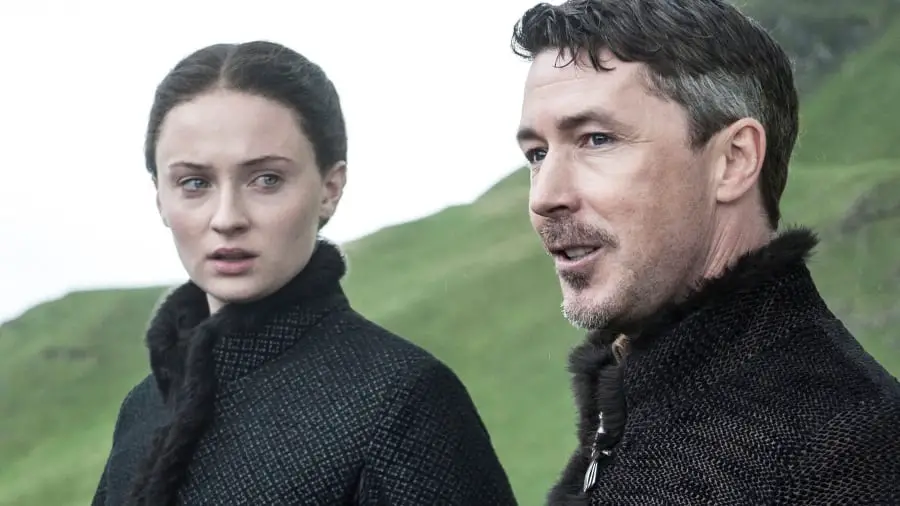
Please tell us how marrying your enemy and thereby legitimizing their claim to what should be your lands and castle is in any way an act of revenge. We’re waiting.
Littlefinger tossed out the lame “make him yours” aspect, but…what? Sansa is giving the Boltons her claim. Even if Ramsay was the nicest husband in the world to her, how does this help the Starks at all? How does this help her on a personal level? She’ll have babies with a man she “made hers” and that’s somewhat nice? A man who is from the family that KILLED HERS?
We will never get sick of talking about how illogical everything is on this show, so to spare you, we’ll direct you once again to our retrospective tag. Find out why Davos and Thorne were playing football over Jon’s corpse! Oh wait…we still don’t know!
#6 The Devil’s in the Details
As a quick point, while the macro-beats of the story make no sense, never fear: the micro-beats don’t either. There’s that consistency we’ve been craving!
We get that some of what we’re about to say are nitpicks, but the writing of GoT betrays, if nothing else, a complete lack of care. Some things have been picked up by astute fans along the way: how many Lannister necklaces are there? How does Arya know to cross off people on her list before news of their deaths could have reasonably reached her? Why did we never hear Theon’s dwarf jokes? Why did Bran choose to go back to the tower flashback after narrowly escaping the Army of the Dead and becoming the Three-Eyed Crow?
However, there’s a lot of smaller things we can point to as well, and this is across every plotline.
Let’s just stay in King’s Landing, because it never gets old for us. Why did Lancel go chase a little boy when he was tasked with bringing Cersei to the sept for her trial? Why did Qyburn tell Pycelle “sometimes before we can usher in the new, the old must be put to rest” when Cersei seemed to have wanted to keep Tommen alive, and therefore on the throne? (Also she’s been queen for 20 years—she’s the outside candidate?) Why did Qyburn stop Pycelle from going to the sept where he’d have blown up in the first place just to give him a special death, especially since “you do not deserve to die alone in such a cold, dark place”? Jeeze, he could have died in a warm explosion with his buddies!
Why does the king have absolutely no one guarding him? Why was the High Sparrow rushing to start Loras’s trial before the King of Westeros was there? Why was the High Sparrow holding the audience to this trial captive when they wanted to leave? How did Cersei extract Septa Unella, who had been tailing Margaery for half the season, without a single person noticing? Why was Cersei not being tailed by a septa? Why did nobody care that there was a zombified Gregor Clegane marching around with Cersei?

And this is just for one musical sequence in one episode!
Granted, we have a lot of fun with some of the sloppiness in the same way we have fun watching Mary Kate & Ashley movies, but this isn’t exactly a sign of quality media.
#7 “Shocking moments” are Really Just Unearned 180°s
“It’s easy to do things that are shocking or unexpected, but they have to grow out of characters. They have to grow out of situations. Otherwise, it’s just being shocking for being shocking.” —George R.R. Martin
Oh Game of Thrones. You twist-master! However, much like M. Night Shyamalan, the shocks that started working out fairly well have become…something else.
In the first few seasons, coincidentally when the show mostly aligned with the book series, the surprising moments made a lot of sense and felt like true twists, without any contrived-nature to them. Ned’s death is probably the finest example, because conventional storytelling would dictate that he lives. Similarly, you expect the wife and son to avenge him, making the Red Wedding doubly shocking, even if all the writing was on the wall when you go back and think about it.
Compare this to Arya poofing across the globe and murdering two men off-screen, taking over a kitchen (somewhere) and baking them into pies, and then feeding them to Walder Frey, who was randomly sitting alone in his giant feast hall during a giant party. This was certainly surprising to us. It’s impossible for it not to be surprising, because…what? How was this moment earned? We can be very fair and say it was foreshadowed because of her list, but if this means that she’s just going to apparate behind her targets and stab them, then that doesn’t exactly make it meaningful.
However, the writers seem so enamoured of shocks, or perhaps so pressured to live up to their reputation as the guys who write shocking television, that they’ll go out of their way to set up a certain situation, just so that they can pull the rug out from viewers in a 180° spin.
Our favorite example of this is with Myrcella’s death. In Episode 9 of Season 5, Ellaria Sand seemed to be very regretful and humbled in her conversation with Prince Doran after a botched attempt to kidnap (or murder?) Myrcella. Then she went on to have a really nice conversation with Jaime about “love is love”, where there is absolutely no hint of duplicity. So in the next episode, where she’s saying goodbye to Myrcella with affection and wishing her well, there’s absolutely no reason why any viewer who’s paying attention to what’s on the screen would think this isn’t sincere.
Except FOOLED YOU! Myrcella dies, and right after having a really nice, touching scene with Jaime, just to twist that knife more. Did this surprise us? Of course it did, because it was sitting in contention with what we saw on the screen. If there had been any hint of something, then okay, but unless we’re supposed to just have intuited that Ellaria is a world-class actor worthy of Indira Varma, there was no way anyone could predict this.
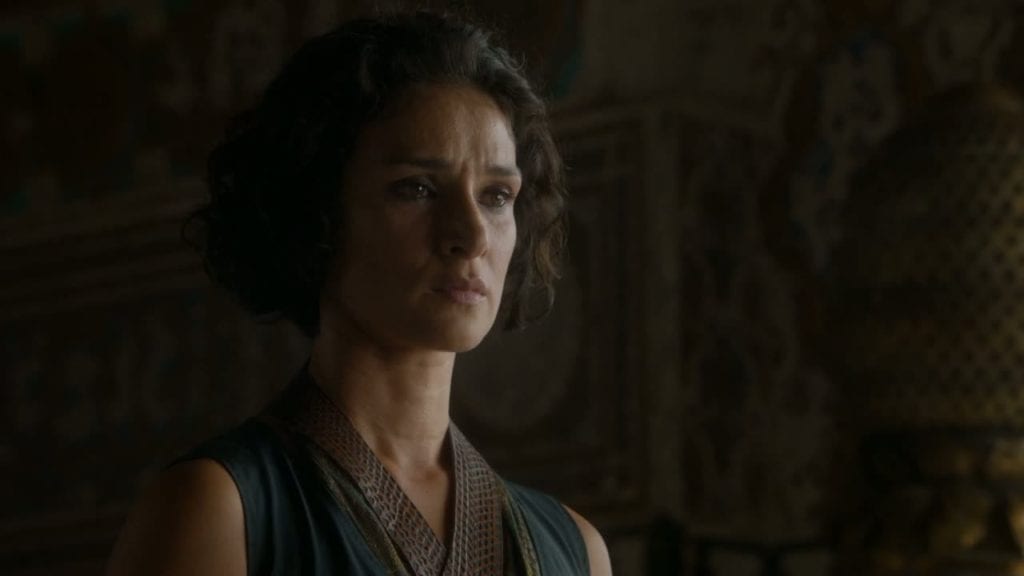
Shireen’s death bore some uncomfortable similarities in a tonal 180° as well. What a fun parallel between these dead girls!
Cersei’s sept explosion certainly was shocking. But to that we direct you back to point #3, because yes, it was shocking to see a reasonable and put-upon character suddenly become a mass-murderer who cared more about torturing a nun than checking on the well-being of her child who probably would have been emotionally affected by said mass-murder.
Other shocks include: Sansa being raped after her scene of assertiveness in the bathtub, Sam coming back for Gilly after reasonably saying goodbye at Horn Hill, Ellaria up and murdering Doran, Daenerys burning down a building and smirking as the flames enveloped her, Lord Umber randomly delivering Osha and Rickon to Ramsay because he liked his kinslaying, Jon being declared King in the North for his incompetence, a crossfade from the baby to Jon’s face that had no consequences in the story at all or to the character discovering it, everyone the Hound had been hanging out with dying, Drogon randomly appearing around a cliff after being too sleepy to help out his mother…
We’re getting bored from all these surprises.
8. It’s All Meaningless
Here’s the thing: there are plenty of pieces of media we love that don’t mean anything; it’s a little hard to think too deeply on the biting commentary provided by The Man with the Golden Gun (never trust a sidekick with a shapely butt?). But that doesn’t mean the entertainment value is any less real, even if it’s a tad ironic in nature at times.
However, in the case of GoT, there is a tendency by viewers and critics to think of it as meaningful. There are entire academic books about the condition of women and what the takeaway is (it’s nothing…see point #2), or how Euron is the most effective critique on Trump that we’ve seen to date. There’s also plenty of discussions of the epic *themes* surrounding the show. We even remember reading a critic gushing about Tyrion spotting that dragon in Season 5, and how meaningful it was in the context of his arc, because he had been at rock bottom. But…why is it meaningful? It was hopeful for him? It was cool to see? We know Peter Dinklage played the scene as if it affected *something*, but it takes more than swelling music for the audience to actually gain something from this.
Take the final sequence where Cersei blows up the sept. The beginning was filmed in such a way that you could tell it was meant to be deep. We got slow close-ups of everyone getting ready. Look, the stays on Margaery’s dress are being tightened…meaningful! We only see the back of Tommen’s head at first…meaningful! But like we described in #6, the entire set-up was out of nowhere and relied on one mind-numbing contrivance after the next. So how was this meaningful?
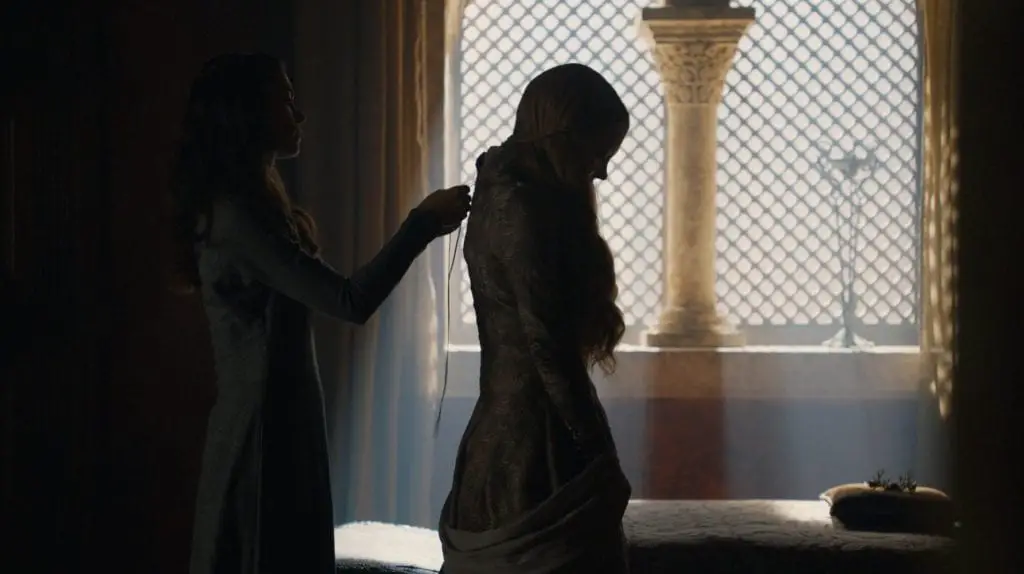
We’re not saying that there isn’t a central message to GoT, because the pattern of the storytelling makes it clear that there is. It’s just one, and it’s incredibly simple: everything is bad and you should feel bad. GoT relies on a nihilism that was considered incredibly deep eighteen years ago when Fight Club came out. But at this point, and especially in this political climate where there’s nothing particularly constructive about embracing a doom-and-gloom futility, it’s hard to say it adds much to our cultural conversation.
Yes, things suck in Westeros in the books. And this is a hard setting for anyone to be having a bonny ol’ time, especially if you’re in any way marginalized. But the problem is that the narrative of GoT doesn’t provide commentary on that, or hold up a lens to the inherently hypocritical and unsustainable nature of such a world. Rather, it points to “look how dark things are” and leaves it at that, while at the same time seeming to take a perverse pleasure in punishing any viewer that cares about a person or place.
There’s multiple examples of this, enough to the point where Fandomental editor Gretchen needed to update her original piece on GoT and acedia, and we certainly don’t want to rehash everything. Rickon almost making it to Jon is a very good example of “haha you moron, did you have hope for three seconds?” But the one we find the most blatant has to be Sandor (the Hound) spending time with happy church-builders in the episode “The Broken Man”.
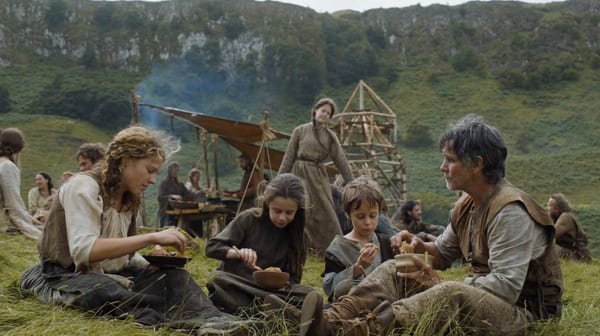
There, Sandor met Septon Ray, who spends the entire episode telling him why he should reject violence and live a peaceful life, as well as why there’s always a second chance for those who wish to reform and push towards healing. Except no! That septon was an idealistic idiot. And he died. Along with all the unnamed Shire-folk who had done nothing but skip gaily around the maypole all episode. Sandor was proven right in his nihilistic worldview, and then went on to be such a hoot of a character, chopping people’s groins with his axe for comedic effect. We can’t make this up; there was an entire joke based around him stealing boots from a still-twitching hanged man.
This goes back to our point about 180°s, of course. The audience needs to have the rug continually tugged from under them, and it needs to be PAINFUL so we can all bask in the grand maturity of this show.
But…what does this do? Because all we’re left with is a story where it’s perfectly legitimate to root for the White Walkers. At least they don’t burn their children alive—they’ve got a great adoption program, from what we can tell.
This is furthered by the fact that there’s really no distinguishing between the actions of the good guys and the bad guys in most cases, apart from HBO’s marketing. For instance, Daenerys burns down a religious institution/entire culture’s social structure to gain followers, and she’s such a badass that we cheer for her. Cersei does the exact same thing, facing far worse odds than Daenerys had of survival we might point out, and she’s a villain. Because…she has black shoulder pads?
And while we’re at it, how is Olenna any better than Cersei, to the point where she’s able to call her “truly vile”? Remember when she murdered Joffrey, and how she’s now wanting revenge on all her enemies? Sounds kind of familiar. If this hypocrisy was called out, then we’d give credit, but it’s not!
Everything is the same on this show. The world sucks, and people act in violent ways to have badass moments. If not for the music and costume changes, we’d have no way of knowing how to feel about anything. Worse still, moments of empathetic connection go horribly punished (looking at you, Lady Crane), and for the most part, everyone is instantly mean to each other, especially women (looking at you, people of Braavos who ignored a bleeding girl in the middle of the streets). We get it, our protagonists—whoever we’re told they are—are up against really shitty circumstances. But this is the opposite of depth.
A wise man once said, “The battle between Good and Evil is a theme of much of fantasy. But I think the battle between Good and Evil is fought largely within the individual human heart, by the decisions that we make.” That wise man was George R.R. Martin, and the point he was making is that the important part of a narrative is not that bad things happen, but it’s that the characters have meaningful reactions to what they experience.
Really, from a Doylist perspective, there’s no point in writing a story where shitty things happen if you’re not going to do anything with that. It’s just offering up dark, grim violence for the audience to voyeuristically consume. That’s not deep; it’s pornographic.
And we’re sorry, but soaking in all this darkness…that’s a privilege. For a lot of us, we don’t need these reminders. Because:
#9 The Social Implications are Horrendous
Yup, here it is. We know that this is where we’re going to lose a lot of people. In fact, we know that there are many who would say we should keep those “social justice” arguments out of a critique. After all, the show falls apart on its own merits as an artform, and even as a coherent narrative.
We think that’s asinine. Especially for a show with such a large audience, as well as pull within the TV industry. Other writers look to GoT as the biggest success, and seek to copy its formula. Not to mention, media isn’t created or consumed in a cultural vacuum. Shows and movies create the forums in which cultural conversations happen, and to ignore the very real-world implications of those pieces of media is irresponsible.
That said, this section could be a piece in itself. In fact, Kylie wrote a series of 3 essays tackling the sexism in Season 6 alone, Zach did his best to take on ableism and homophobia with just two characters of the show as examples, we needed an entire two sections in our Meereen Season 6 retrospective to thoroughly explain the racism in both Tyrion and Daenerys’s plotlines, and we still fell short of being able to comprehensively look at the ageism, the ableism (though we tried with Hodor-gate), and utterly pervasive anti-religion aspects of the show.
We realistically can’t lay this all out here, or else no one is ever getting through this piece. If you want to take a deep dive, please click the links in the paragraph above. No, we don’t think GoT is sexist because there’s violence against women. This is something we should all be talking about more, and we praise shows that handle the topic with the sincerity and severity it deserves. GoT does not do anything close to that. Not to mention, men who happen to be victimized in this narrative are completely ignored, or treated as jokes.
We don’t think this show is racist because people of color are marginalized in Westeros. We think it’s racist because it accidentally endorses colonialism and takes in-verse stereotypes at face-value. Ableism? PTSD is treated as an inconvenience, mental disabilities are treated as giant mysteries that need solving, and physical differences are treated as punchlines (remember when Jaime stopped a sword with his golden hand?). Homophobia is all about the straight people while Loras silently suffers, or Yara is made into a big gay stereotype (and an accidental rapist). And the brown, hypersexualized bisexual Ellaria Sand who is so violence happy that she murders an innocent straight white girl with a kiss really isn’t doing the show any favors either.
There’s always room for us to keep going. Even Season 6, which was meant to solve their “woman problem”, was full of misogynistic assumptions and molds for “empowerment.”
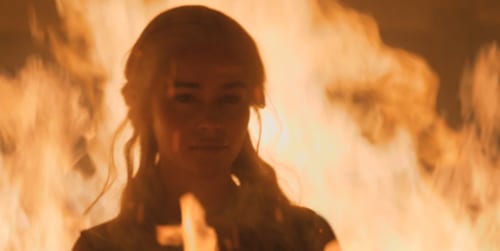
It’s a major problem. It’s actually about fifty problems rolled up into one, but we’re trying to be efficient here. Your entertainment doesn’t have to come with a side of racist misogyny, we promise.
And we’re not saying that anyone who doesn’t notice this pattern is a horrible person either. We’re just saying to please not silence the voices of those who have noticed it, and who don’t find it acceptable. Because really, why should it be?
So…Now What?
We know that throughout this piece, we made a lot of sweeping statements, such as “nothing makes sense.” But the thing is, we arrived at each of these points after careful and thorough contemplation. Do you know that we once loved this show? And we really, really wanted to keep liking it? With GoT, however, once the wool is pulled from your eyes, there’s no putting it back. Not only is any benefit of the doubt or suspension of disbelief gone for us, but we find it almost unthinkable that it still exists for others.
We recognize that for that reason, we’re coming from a different viewpoint. To reiterate: we don’t blame anyone for liking the show, nor do we want to necessarily discourage that. What we do want to discourage, however, is anyone acting like this show is the greatest thing since The Sopranos. Call it a ‘guilty pleasure’, fine, but we fundamentally don’t understand treating it as anything else.
We’re also confused as to why many of the critics that rave about GoT are the same critics who were counting gallons per minute on Breaking Bad, or giving the rather popular Iron Fist the tearing apart it deserves. And sure, there are critical pieces on Sansa’s rape, plus almost no one has been able to muster any enthusiasm for Dorne. We don’t want to pretend that the show is completely beyond criticism. It’s just not getting the level scrutiny it deserves by any stretch of the imagination.
That’s why we’re here, and that’s why we’ll continue to be here. We hope you join us as we continue to have our fun, while taking this show to task. Because it’s not just about Sansa’s wedding night or Ellaria stabbing Doran. It’s about the foundation of utter illogic, incoherence, inconsistency, and nihilism told on the backs of marginalized individuals.
You can find enjoyment in shows like this. Heck, even we find enjoyment in commenting on Game of Thrones. We’d just never think for a second to call it “good.”


